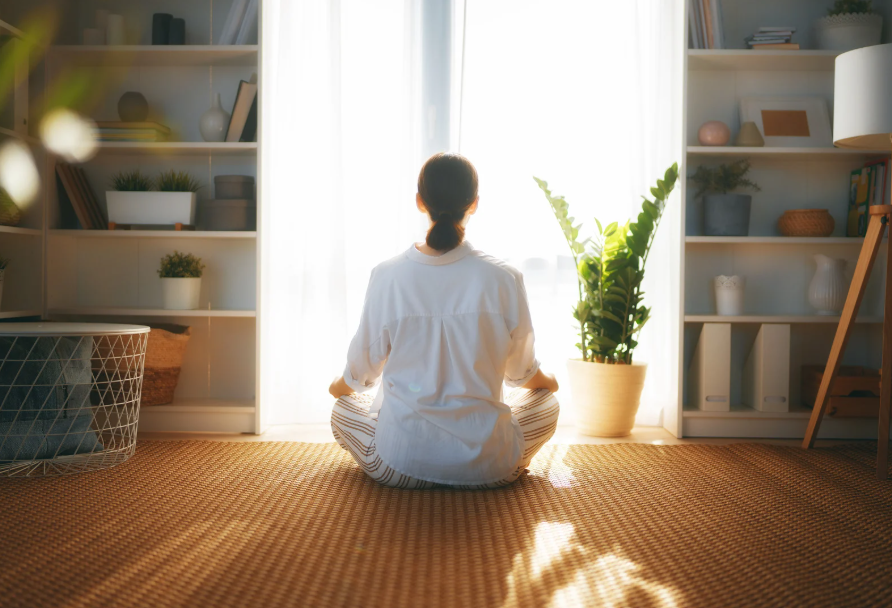I used to think self-care was selfish. Sitting there in my car after another twelve-hour day at work, hip aching from pushing through pain, exhausted from pouring into everyone else while ignoring my own needs, I believed that good Christian women put themselves last.
Always.
That belief nearly broke me.
At 59, I’ve learned something that would have saved me years of burnout: caring for myself isn’t selfish—it’s stewardship. It’s not taking away from others—it’s ensuring I have something genuine to give. It’s not worldly self-indulgence—it’s biblical wisdom about honoring the temple God entrusted to me.
Let me tell you how I went from burnout to blessed, and why faith-based self-care changed everything about how I serve God and others.
The Day I Realized I Was Running on Empty
Picture this: me at 57, dragging myself through another morning routine, already exhausted before the day began. Working full-time, saying yes to every extra request, pushing my body through workouts that left me more depleted than energized. I was the teacher who stayed late to help struggling students, the colleague who took on extra duties, the friend who was always available for crisis calls.
I wore my exhaustion like a badge of honor. “I’m tired, but blessed,” I’d say with a weary smile, as if being completely drained was somehow more spiritual than being rested and ready.
But my body was staging a rebellion. The hip pain that had been whispering for months was now shouting. My energy crashed every afternoon. I found myself snapping at students I genuinely loved, feeling resentful toward commitments I’d freely chosen. I was giving from an empty well, and everyone could tell the water was bitter.
The breaking point came during a staff meeting when I realized I couldn’t remember the last time I’d felt genuinely joyful about anything. I was surviving, not thriving. Existing, not living. Going through the motions of faith without experiencing the abundant life Jesus promised.
That’s when I understood: I wasn’t honoring God with my burnout. I was dishonoring Him.
The Lie That Nearly Destroyed Me
Somewhere along the way, I’d bought into the lie that self-sacrifice meant self-neglect. That being Christ-like meant being available to everyone, all the time, regardless of my own needs. That caring for myself was somehow less holy than caring for others.
Working in Christian education, I saw this lie everywhere. Teachers who bragged about working through sickness. Staff members who skipped meals to help students. Administrators who wore their stress like a spiritual gift. We mistook depletion for dedication, exhaustion for faithfulness.
But here’s what I’ve learned: you can’t pour from an empty cup. You can’t give what you don’t have. You can’t love others well when you’re not caring for yourself at all.
The morning I could barely get out of bed, not from physical illness but from complete emotional and spiritual exhaustion, I knew something had to change. I opened my Bible to Matthew 22:39: “Love your neighbor as yourself.”
As yourself. Not instead of yourself. Not more than yourself. As yourself.
For the first time, I realized that loving myself wasn’t optional—it was commanded. How could I love others well if I didn’t even know how to love myself? How could I encourage my students to take care of themselves if I was modeling self-neglect?
That’s when my journey from burnout to blessed began.
The First Steps: Learning to Breathe Again
The transformation didn’t happen overnight. After years of chronic burnout, I had to relearn what it meant to care for myself in ways that honored God.
I started with breath. Literally. During my morning devotions, I began paying attention to my breathing. Not as some new-age practice, but as a way of receiving God’s gift of life moment by moment. Deep, intentional breaths that reminded me I was alive, beloved, and worthy of care.
I gave myself permission to rest. This was revolutionary. I started viewing rest not as laziness but as obedience. God rested on the seventh day and commanded His people to do the same. Who was I to think I was above His design?
I began saying no without guilt. This one nearly killed me. The first time I declined a request for help, I felt like I was betraying my faith. But I wasn’t. I was finally understanding that my yes to one thing had to be a no to something else. I chose to say yes to my own well-being so I could say yes to God’s best for my life.
I rediscovered joy. When was the last time I’d done something purely because it brought me happiness? I couldn’t remember. So I started small—ten minutes of worship music that made me smile, a cup of tea enjoyed slowly instead of gulped on the run, a short walk outside just because the sky was beautiful.
The Three Pillars of Faith-Based Self-Care
Through trial and error, prayer and reflection, I discovered three pillars that support genuine, God-honoring self-care:
Physical Stewardship: Honoring God’s Temple
My hip pain became my greatest teacher. It forced me to acknowledge that my body isn’t just the vehicle that carries me through life—it’s the temple of the Holy Spirit. And I’d been treating God’s temple with neglect and abuse.
Faith-based self-care meant learning to move my body gently rather than punishing it. PowerPlate sessions that strengthened without strain. Walking meditation that combined physical activity with spiritual practice. Resistance band workouts that I could do while listening to worship music.
But it went beyond fitness. It meant eating meals instead of grabbing snacks between meetings. It meant going to bed at a reasonable hour instead of staying up late to finish “just one more thing.” It meant taking my vitamins, drinking enough water, and yes—going to the doctor when something hurt instead of pushing through pain.
The beautiful surprise? When I started caring for my body as God’s temple, I had more energy for everything else. More patience with difficult students. More creativity in my teaching. More joy in my daily tasks.
Emotional Wellness: Feeling My Feelings
Growing up in church, I’d learned to spiritualize my emotions rather than actually dealing with them. Frustrated? “I should be more patient.” Sad? “I should count my blessings.” Angry? “I should forgive and forget.”
But faith-based self-care taught me that emotions aren’t sinful—they’re informational. When I felt overwhelmed, it meant I was taking on too much. When I felt resentful, it meant I was giving without receiving. When I felt joyless, it meant I was going through the motions instead of genuinely connecting with God.
I started journaling during my quiet time, not just reading scripture but processing my emotional responses to life. I began praying with complete honesty about my feelings instead of just the feelings I thought I should have. I learned to recognize stress signals before they became burnout symptoms.
The psalms became my greatest comfort during this season. David didn’t spiritualize his emotions—he felt them fully and brought them honestly to God. If it was good enough for the man after God’s own heart, it was good enough for me.
Spiritual Nourishment: Feeding My Soul
Here’s the irony: in my burnout, I’d lost touch with the very God I was trying to serve. My quiet times had become rushed obligations. My prayers had become grocery lists of requests. My faith had become a duty rather than a relationship.
Faith-based self-care meant falling in love with God again. It meant approaching Him not as a task master but as a loving Father who wanted to spend time with me. It meant reading His word not to check off a spiritual box but to hear His voice speaking life into my weary soul.
I started taking communion at home sometimes, just me and Jesus, remembering that His body was broken and His blood was shed so that I could have abundant life—not just eternal life, but full, rich, meaningful life right here, right now.
I began worshipping during my workouts, turning exercise into a celebration of what God had given me. I started praying during my walks, turning simple movement into sacred time. I learned to see God in small moments—a student’s breakthrough, a colleague’s kindness, my grandson’s laughter.
The Resistance I Faced (And Still Face)
Let me be honest: embracing faith-based self-care wasn’t met with universal support. Some people didn’t understand why I was suddenly unavailable for every request. Others questioned whether I was becoming “too worldly” by focusing on my own needs.
The Guilt: Even now, at 59, I sometimes feel guilty for taking time for myself. The old messages die hard. “Shouldn’t you be doing something productive?” “Are you being selfish?” “What would people think?”
The Comparison: Social media doesn’t help. Seeing other women my age who seem to handle everything with ease while I’m learning to set boundaries can trigger those old feelings of inadequacy.
The Perfectionism: I wanted to do self-care “right” too. I’d plan elaborate morning routines and then feel guilty when life interrupted. I had to learn that self-care, like faith, is about progress, not perfection.
The Misunderstanding: Some people equate self-care with selfishness. They can’t understand that caring for yourself actually enables you to care for others better. I’ve had to learn that not everyone will understand my journey, and that’s okay.
What Faith-Based Self-Care Actually Looks Like
Here’s the practical reality of how faith-based self-care shows up in my daily life:
Morning Quiet Time: Not rushed or guilt-driven, but spacious enough to actually connect with God. Sometimes it’s thirty minutes. Sometimes it’s five. Both honor Him.
Gentle Movement: PowerPlate sessions that feel like worship. Walks that become prayer time. Stretching that reminds me to be grateful for a body that works.
Emotional Check-ins: Throughout the day, I ask myself: How am I feeling? What do I need? What is God trying to tell me through my emotions?
Boundary Setting: Saying no to good things so I can say yes to God’s best. This is still hard, but it’s getting easier.
Joyful Moments: Deliberately seeking small pleasures that remind me God is good. A beautiful sunset. A cup of perfectly brewed coffee. A spontaneous dance party in my living room.
Sabbath Rest: Actually resting one day a week, not just switching from work tasks to home tasks. This was revolutionary.
Nutritious Meals: Eating becomes an act of stewardship rather than fuel for more productivity.
Quality Sleep: Going to bed at a reasonable hour because rest is holy, not lazy.
The Ripple Effects: How Self-Care Improved My Service
The beautiful irony of faith-based self-care is that it actually made me better at serving others. When I started caring for myself, I had more to give. When I stopped running on empty, I could pour out of abundance instead of scarcity.
At Work: My students started commenting on my patience and energy. I was more creative in my teaching, more present in my interactions, more joyful in my daily tasks.
In Relationships: I stopped being the friend who was always tired, always stressed, always complaining. I had emotional energy for others because I was no longer emotionally depleted.
In Ministry: I could serve from a place of genuine love rather than obligation. My heart was full, so my service was authentic.
As a Grandmother: I had energy to get down on the floor and play. I was present for the precious moments instead of distracted by my own exhaustion.
In My Marriage: I stopped being the cranky wife who snapped at every little thing. I had patience and grace to offer because I was receiving patience and grace from God.
The Spiritual Lessons Hidden in Self-Care
Through this journey, God taught me profound spiritual truths through the simple act of caring for myself:
Grace covers imperfection: I don’t have to be perfect at self-care any more than I have to be perfect at anything else. Some days I nail it. Some days I don’t. God’s love remains constant.
Stewardship applies to everything: Just as I’m called to steward my finances, my talents, and my time, I’m called to steward my body, my emotions, and my energy.
Love is demonstrated through action: Loving myself isn’t just a feeling—it’s a choice to act in ways that honor the person God created me to be.
Seasons require different care: Just as my garden needs different care in different seasons, I need different self-care in different seasons of life. What worked in my thirties doesn’t work in my fifties, and that’s okay.
Community matters: I can’t care for myself in isolation. I need other women who understand this journey, who can encourage me when I’m struggling, who can celebrate with me when I’m thriving.
Overcoming the Biggest Obstacles
If you’re struggling to embrace faith-based self-care, here are the obstacles I had to overcome and how I did it:
“I don’t have time”: I had to realize that self-care isn’t something extra I add to my schedule—it’s the foundation that makes everything else possible. Five minutes of intentional breathing is better than zero minutes of care.
“It feels selfish”: I had to understand that self-care enables service, not prevents it. I’m more loving when I’m not exhausted. I’m more patient when I’m not overwhelmed. I’m more joyful when I’m not depleted.
“I don’t know how”: I had to start small and learn as I went. Self-care isn’t a skill you master overnight—it’s a practice you develop over time.
“People need me”: I had to accept that people will always need me, but I’m not always the person who needs to meet every need. Sometimes the most loving thing I can do is empower others to solve their own problems.
“I feel guilty”: I had to retrain my brain to see self-care as obedience, not rebellion. When I care for myself, I’m honoring God’s design for human flourishing.
Your Invitation to Move from Burnout to Blessed
Maybe you’re reading this while running on fumes. Maybe you’re so tired you can’t remember what it feels like to be energized. Maybe you’ve been taught that self-care is selfish, and you’re afraid to even consider it.
Let me offer you the same grace that God offered me: you are beloved, you are worthy of care, and you are not meant to live in chronic exhaustion.
Faith-based self-care isn’t about bubble baths and spa days (though those can be wonderful). It’s about aligning your life with God’s design for human flourishing. It’s about stewarding the temple He’s given you. It’s about loving your neighbor as yourself—which requires actually loving yourself.
Start small. Take five deep breaths and thank God for the gift of life. Drink a glass of water slowly and mindfully. Go to bed fifteen minutes earlier tonight. Say no to one request this week. Take a short walk and notice God’s creation.
You don’t have to overhaul your entire life overnight. You just have to take the next small step toward caring for the person God created you to be.
The Vision That Keeps Me Going
At 59, I have a clear picture of what I want my remaining years to look like. I want to be the woman who radiates joy instead of exhaustion. The teacher who serves from abundance instead of depletion. The grandmother who has energy for adventures. The wife who brings peace to her home instead of stress.
I want to model for younger women what it looks like to age with grace, energy, and purpose. I want to show them that caring for yourself isn’t selfish—it’s essential. I want to demonstrate that you can serve God wholeheartedly while also honoring the person He created you to be.
Most importantly, I want to finish strong. Not burned out, used up, and empty, but filled with God’s joy, strengthened by His grace, and energized by His love.
This is what faith-based self-care offers: not a life of self-indulgence, but a life of sustainable service. Not a focus on ourselves instead of God, but a focus on God through caring for ourselves. Not taking away from others, but ensuring we have something genuine to give.
The journey from burnout to blessed isn’t always easy, but it’s always worth it. Because when you’re blessed, you become a blessing. When you’re filled, you can pour out. When you’re thriving, you can help others thrive too.
And that, dear sister, is exactly what God had in mind when He created you not just to survive, but to flourish.
Your burnout doesn’t define you. Your exhaustion doesn’t have to be permanent. Your worth isn’t measured by how much you can do or how tired you can get.
You are loved beyond measure, worthy of care, and called to abundant life. Faith-based self-care is simply the pathway to receiving what God has always wanted to give you: a life of joy, purpose, and sustainable service.
The journey from burnout to blessed starts with a single step. Are you ready to take it?




